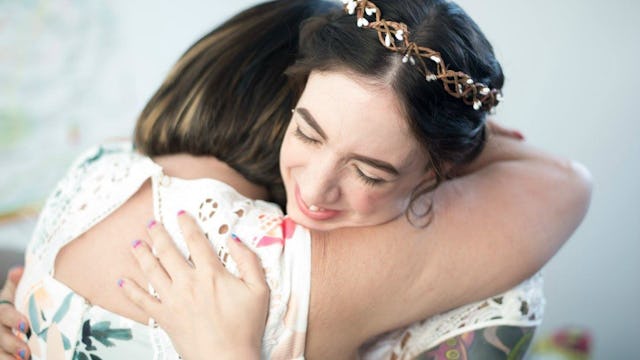'Thank God You’re Fat'

I am not a religious person. Still, I try to be consciously grateful for the things I have. A roof over my head. A persistently patient partner. Eggos in the freezer.
The fact my mum is fat.
I know she would find this gratitude strange; she doesn’t like her body, softer and larger than it has ever been. She chunters at her size, poking the round swell of her tummy like a foreign object — because, in a way, it is. In her early twenties, she boasted a 22″ waist, accentuated with bell-bottomed trousers. She was smaller then than I have been or will ever be. For the longest time, she has kept a photo of herself from back then, posed in a turquoise bikini, waves rushing into frame behind her, a reminder of the smaller space she used to take up in the world.
Yet that wasn’t her thinnest point.
That was when she was 42, 5’4″, an emaciated 84 pounds — the healthy weight of an 11-year-old.
We don’t have pictures from that time, but the way she looked is clear in my memory. The way her jeans hung off her sharp hips. The way she felt, so small and fragile, her bones jutting into my soft skin. So small, hunched over in the middle of our kitchen. My heart fluttered with fear when I embraced her, that she might crumble in my arms. Her skin was thin, translucent and brittle, like old-fashioned tissue paper. Holding her felt like the first time I was handed my baby brother — the deliberately delicate movements, the whispery touch — with none of the joy of meeting someone new. I couldn’t hold her tight, even as I wanted to clasp her to the world, keep her from floating away.
I stared at the stripe of bones — her ribcage, peeking from the scoop neck of a baggy t-shirt — and was pulled into the dark trenches, like tripping over a row of open graves.
At that small size, she felt untethered. I wanted to lend her my weight, anchor her until she felt real. All I could do was usher her gently towards eating again — something her PTSD-ravaged body had struggled with until her spine looked like the plated back of a stegosaurus, protruding and painful.
She pecked at food like a sparrow at first, daunted by a mouthful that could actually fill her mouth. Slowly, she made a dent in dishes of tender stewed meat and soft potatoes, easy foods to swallow. She drank nutrition-dense shakes, designed for the underweight or terminally ill, adults who couldn’t handle solids any more. Her ribs filled in. The bowl of her stomach filled until it was level. Her jeans stayed up, and she had the energy to stand.
In a world that celebrates skinny, it is hard to compliment weight gain. It feels perverse; we have no words for it. The collection of euphemisms around fat bodies is so broad, it’s difficult to reach for accurate words without offering an insult — potentially sending a recovering person back to the well of disordered eating. I didn’t dare say she was looking bigger, heavier, less bony; I didn’t tell her that it was nice the shadows under her cheeks weren’t as deep. I stuck to phrases like “you’re looking healthier” or “you look happier.” On the days everything came back up, I didn’t say anything at all. I just held her.
Fifteen years has passed. The steroids in her asthma medication have caused my mum’s weight to balloon into soft folds, hiding the ribs I still remember. The trauma, so raw then, has been buried in an avalanche of time and therapy. Her appetite — for life as much as food — is back, and making up for lost time. We can go for dinner without a fear of food looming like an uninvited guest. She laughs and loves heartily; she is visiting Vancouver this Christmas and is already ravenous for adventure. It is everything I dreamed of in those fragile days.
Yet in the eyes of society, her overweight body is a failure, her underweight one an aspiration. A body as light as its shadow, a body so small I feared she’d slip away any second, is closer to the ideal on our spectrum of beauty than the grounded version of her today. The version of her I can squeeze in a fierce hug when I need it, because everyone needs their mum sometimes. The version who is bursting with life, not withering away from it. The body that doesn’t feel haunted by the spectre of death, the stark bones a reminder of all that will be left one day.
The fact my mum is fat is a source of comfort. Her softer, larger body is more full of life, laughter, and love than it ever was before. Yet praising a fat body for its size, its reassuring gravity, its sheer physical presence and the way it overwhelms me with joy, feels taboo.
In a world where cancer is presented as having the glorious upside of rapid weight loss, it doesn’t feel overblown to say I feel acutely aware of the social norms I’m bucking to say this: my mum is bigger, happier and more beautiful than she has ever been. Her body is still nowhere near the size of her huge personality, which will forever spill beyond the capacity of of the space she finds herself in, but it is as buoyant and vibrant as as her heart — and for that, I can be nothing but thankful.
This article was originally published on